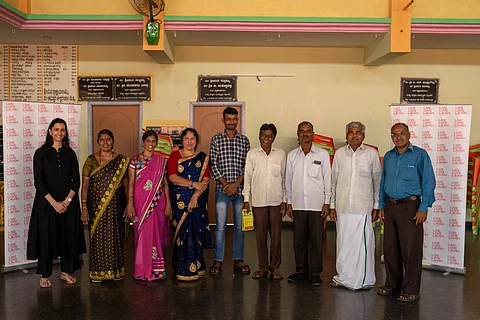

Thirty-year-old Lakshmana in Karnataka’s Davanagere faced a daunting battle with schizophrenia following a tragic road accident and subsequent brain injury. Isolated and struggling with daily activities, Lakshmana's family, like many in rural areas, lacked awareness about mental health and resorted to tying him down at home. The cost of his private treatment exceeded Rs 4 lakh, a significant financial burden for the family.
Live Love Laugh Foundation, founded by actor Deepika Padukone, extended a helping hand. Through the foundation's dedicated rural programme, Lakshmana received vital psychiatric interventions and invaluable counselling. As his condition improved, the foundation extended a loan to him for purchasing sheep, aiding his path to recovery. Lakshmana is one of 2,178 beneficiaries in Davanagere district, where the programme's pilot phase was initiated.
Anisha Padukone, CEO, outlined the programme's key components — awareness campaigns, accessible treatment options, and affordable financial support through government programmes. The initiative also prioritises caregiver training and support. Presently, the programme operates in various districts across multiple states. The foundation emphasises collaboration with local grassroots partners and community members, including ASHA workers. In Davanagere, they have partnered with The Association of People with Disability (APD), which implements the programme on the ground. According to Anisha, working with grassroots partners is beneficial for a community-based program as the partners can build better rapport within the community and improve the effectiveness of the program.
Live Love Laugh's intervention in Davanagere district, now in its sixth year, has achieved self-sustainability. The foundation's model emphasises community-based mental health care, offering replicable solutions for rural regions that often lack resources. The programme focuses on training community members to become leaders and caregivers, to achieve self-sufficiency within five to seven years, reducing the need for long-term dependency. “In Davanagere, we have six fellows, one for each taluk, who are trained to take the programme forward,” Anisha says.
Lakshmana's mother, Ellamma, is a shining example, serving as a fellow and in charge of Channagiri taluk, aiding numerous individuals with disabilities in her area.
Meet 60-year-old Malleshappa, a fellow in charge of Harappanahalli taluk. His wife battled postpartum psychosis, a struggle that led them on a long and costly journey through hospitals and healers. Determined to prevent others from enduring a similar ordeal, Malleshappa became a community leader. His bag, filled with letters to the district administration urging the despatch of vital medicines, is a testament to his unwavering commitment to his community's well-being. What would he do if there was no medicine at the health centre? He immediately opens his bag to show numerous letters he has written to the district administration to despatch medicines for the people.
Director of Mental Health at APD Janardhan sheds light on a major hurdle—the pervasive mindset surrounding mental health in rural India. Superstitions, concerns of family 'honour', and a reliance on 'faith healers' conspire to make seeking help an uphill battle. The fear of social ostracisation compounds the challenge, making it a deeply personal and often hidden struggle.
An example of this mindset manifests at the Ukkadagatri temple in Davanagere. On Mondays and new moons, the temple transforms into a hub for exorcisms. The Live Love Laugh Foundation, in collaboration with the temple authorities, have found a unique way to coexist with traditional beliefs. While the 'possessed' receive their ritual, the foundation's posters quietly spread awareness about mental health. The temple administration now supports an alternative medication system and facility to care for mentally ill patients, a step forward in the journey to destigmatise mental health care. “You can’t oppose people’s beliefs, which is why we decided to approach the temple administration to create an alternative medication system and facility around the temple to treat mentally ill patients,” Janardhan says.
The Foundation’s rural programme employs several strategies to combat stigma and dispel misinformation. Street plays, informational pamphlets, and collaborations with local pharmacies ensure vital medications are within reach. ASHA workers and healthcare professionals receive comprehensive training to facilitate doorstep delivery of services. Through support groups, patients and caregivers find solace in shared experiences, openly addressing their challenges and concerns.
The rural programme, concentrated in Deepika Padukone's home state of Karnataka, has extended its reach to Himachal Pradesh, Odisha, Madhya Pradesh, Kerala, and Tamil Nadu. Their impact is palpable, with 4,314 direct beneficiaries receiving free treatment and 20,655 caregivers finding support across 21 taluks. The Live Love Laugh Foundation is working across Davanagere, Kalaburagi, Bidar, Belagavi and Mysuru districts in Karnataka, Thiruvallur and Theni in Tamil Nadu, Koraput and Puri in Odisha, Chhindwara in Madhya Pradesh, Kangra in Himachal Pradesh and Idukki in Kerala.